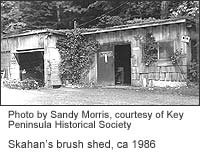 Helen Skahan lives and gardens on the land where she was raised.
Helen Skahan lives and gardens on the land where she was raised.
Charles and Anna Davis, her maternal grandparents, settled in Elgin in 1905, where the Brookside Restaurant stands. Their house, on skids, was hauled from Rainier log camp by horses. Helen Lunore, born in 1918, grew up across the road (now 118th).
A regular chore was starting the economy engine pump, to get water from the spring to fill water barrels. It was hard, and if she didn’t release the handle at the right time, it went flying off. They used this water to bathe, wash dishes and clothes, but her mother wanted fresh spring water for her churned butter. Helen carried that until her mother decided it was time her brother, three years younger, needed to learn how. He raced to the spring, roiled the waters and dashed back up to the house.
“I would carry it six times over instead of him doing it once,” she says. She told her mother what he did and said she’d do it, but her mother said her brother had to learn how. She wonders still about her mother’s thinking.
Skahan helped churn butter in the large cedar churn. It held four or five pounds of butter.
The family had chickens and always one cow. “One miserable cow” would go down to the bay at certain times of the year. There were no fences, neighborhood cows grazed freely, and returned home at night. This cow had to be hunted and brought back home when she headed for the salt water.
Skahan cut and carried wood and kindling.
She once offered to help her grandmother sew. She tried to take tiny, careful stitches, but her grandmother said they looked like basting stitches, appreciated the help offered, and said she’d do it herself.
“Grandma sewed everything by hand,” says Skahan. When she was given a treadle sewing machine, she was afraid to use it.
Skahan attended Elgin school—seven grades with one teacher. “We went to school from 9 o’clock until 4, with an hour for lunch, and two recesses,” she says. “It was almost dark when we came home in the winter.”
She married Bert Day in 1935. Day was assistant superintendent for the fish hatchery at Minter Creek, and the family lived in one of two identical houses on the hill. When he was promoted to superintendent, they had to move to the other house, a few feet away, over Helen’s objections. She feared her children would fall down the stairs to the hatchery.
Day died suddenly at age 35, and Helen was left with small children, ages 2, 4 and 6.
She shucked and washed oysters. In the summer, she picked wild blackberries for neighbor Hazel Fenton’s pies sold at the Fenton auction. She helped Hazel in the kitchen at the Glenwood dances every Saturday night.
“I hated the waltz and pokey dances. I liked the Varsouvienne and schottische,” she said.
She met Elmer Skahan there, and after they married, they built a brush shed on the property. Elmer, Helen’s son Verne, and her stepdad all picked brush. She enjoyed doing it, too, but was the one who managed the shed. She bunched the huckleberry or salal, wired, weighed, trimmed stems, put 20 bunches into a bale, and tied it. She wore the tread off the bottom of her boots in about a month, working on the concrete floor. A buyer from Portland picked up 1,000 bunches a week and shipped them to New York.
Today, she tends her large flower garden, and in her “spare time,” crochets and knits items to sell at the Port Orchard Saturday Farmers Market.
Skahan considers moving to a smaller place. “What plants would you take?” ask her daughters. She loves them all, and continues to tend her large garden where she’s lived most of her 87 years.
UNDERWRITTEN BY THE FUND FOR NONPROFIT NEWS (NEWSMATCH) AT THE MIAMI FOUNDATION, THE ANGEL GUILD, ADVERTISERS, DONORS AND PEOPLE WHO SUPPORT INDEPENDENT, NONPROFIT LOCAL NEWS